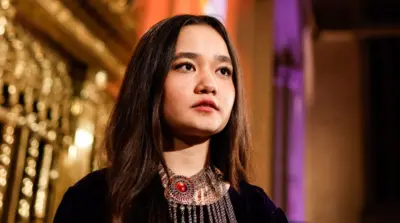We've updated our Privacy and Cookies Policy
We've made some important changes to our Privacy and Cookies Policy and we want you to know what this means for you and your data.
Gunmen kill 133 at Crocus City Hall in Moscow attack
- Author, Paul Kirby & Andre Rhoden-Paul
- Role, BBC News
Gunmen have attacked a concert hall on the fringes of Moscow, killing at least 133 people and wounding 140 more, Russian security services say.
Attackers clad in camouflage gear took part in the attack, in the north-western suburb of Krasnogorsk, BBC-verified video shows.
Four men directly involved were among 11 arrested on Saturday, officials say.
Crocus City Hall was about to host a rock concert when the gunmen burst into the foyer and then the theatre itself.
Much of the building was engulfed by fire and part of the roof collapsed.
Children are said to be among the casualties and the Russian foreign ministry has condemned a "terrorist attack".
According to an unverified statement online, militant group Islamic State said it was behind the attack.
US officials told CBS, the BBC's partner service in the US, that it had obtained intelligence that showed IS had wanted to attack Russia. The White House said it had warned Russia earlier this month of plans for a potential attack in Moscow targeting "large gatherings".
Russia's National Guard said it had special units working at the scene to hunt down the attackers. Top Russian officials also headed to Krasnogorsk.
Two weeks ago, the US embassy put out a warning to US citizens to avoid large gatherings, saying it was monitoring reports that "extremists have imminent plans to target large gatherings in Moscow". It updated its advice on Friday evening, urging US citizens to avoid the vicinity of the attack.
More than 6,000 Russians had flocked to the Crocus City Hall retail and concert complex for a concert by rock group Picnic. One witness said the violence erupted minutes before the band were due to come on stage. Picnic's band members themselves were unharmed.
Russian President Vladimir Putin has not yet directly addressed the nation.
A security guard described how the heavily-armed attackers burst into the foyer firing bullets as he and his colleagues were working at the central entrance.
"There were three other security guards and they hid behind an advertising board," he told Russian telegram channel Baza. "And those attackers passed 10m [30ft] away from us - they started shooting randomly at people on the ground floor."
Inside the auditorium a woman said she and other visitors rushed towards the stage, as soon as they realised shots were being fired. "I saw a person in the stalls with a sidearm and there were cracks [of gunfire] going off, I was trying to crawl behind a loudspeaker," she told Russian TV.
Fire and plumes of smoke rose into the sky and the hall's facade burst into flames as glass on the top two floors of the building blew out.
Image source, .
The fire appeared to have started when the attackers threw some kind of incendiary device.
One man, Vitaly, described seeing the attackers opening fire while he was on a balcony in the concert theatre: "They threw some petrol bombs, everything started burning. We were led out towards an exit."
Another eyewitness said children and teenagers were in the complex at the time of the attack, taking part in a ballroom dancing competition.
While some of those in the concert hall were able to flee to the parking area from the stage, others headed to the roof and Russian authorities said about 100 more had escaped through the basement.
Dozens of ambulance crews were immediately sent to the scene and stood outside the complex in Krasnogorsk for some time after the attack.
Image source, Reuters
Moscow Mayor Sergei Sobyanin responded by cancelling all public events in the capital over the weekend. "I am sorry for the loved ones of the victims," he said.
In the following hours several other regions also cancelled events, including Russia's second biggest city St Petersburg.
Russian Foreign Ministry spokeswoman Maria Zakharova called on the international community to condemn the incident, calling it "a monstrous crime".
Ukraine's government was quick to deny any involvement in the attack, which comes more than two years after Russia launched a full-scale invasion of its neighbour.
"Regardless of everything, for Ukraine everything will be decided on the battlefield," presidential adviser Mykhailo Podolyak said on Telegram.
Only six days ago Vladimir Putin won a fifth term in Russian presidential elections. The vote did not include any genuine opponents and Western countries denounced the elections as neither free nor fair.
Ukrainian military intelligence spokesman Andriy Yusov suggested the attack was a "deliberate act of provocation by Putin's special services", without offering any evidence.
Image source, Reuters
Friday night's attack was the worst targeting civilians in Moscow for years, but it brought back memories of a theatre siege in the capital in 2002, when 40 Chechen militants took more than 900 people hostage during a musical called NordOst.
Russian security services eventually stormed the theatre, pumping sleeping gas into the hall. Some 130 hostages died.
Security has now been tightened at airports and stations.
White House spokesman John Kirby said the images of the shooting were "horrible and hard to watch".
"Our thoughts obviously are going to be with the victims of this terrible, terrible shooting attack," he said.
Image source, REUTERS/Maxim Shemetov
If you, friends or family have been directly affected by the events published in this story email: haveyoursay@bbc.co.uk.
Please include a contact number if you are willing to speak to a BBC journalist. You can also get in touch in the following ways:
- WhatsApp: +44 7756 165803
- Tweet: @BBC_HaveYourSay
- Upload your photos/videos here
- Or fill out the form below
- Please read our terms & conditions and privacy policy
If you are reading this page and can't see the form you will need to visit the mobile version of the BBC website to submit your question or comment or you can email us at HaveYourSay@bbc.co.uk. Please include your name, age and location with any submission.
Top Stories
More to explore
Most read
Content is not available








